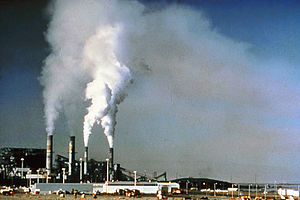Thanks to environmental regulation and standards in this country, we are not facing the level of pollution crisis that cities such as Beijing and Mexico City experience on a regular basis. Nor are we likely to have an entire city shut down because of air pollution like Harbin in China.
However, we are still subject to days or even weeks of elevated air pollution in this country, and that means that our health may suffer serious consequences.
Respiratory Health Effects of Air Pollution
Air pollution passes directly into your lungs where your body absorbs some of it as it is trying to extract the oxygen you need to live. So of course some of the most dangerous effects of air pollution would be associated with your lungs.
Asthma can be caused by air pollution or exacerbated by it. People with asthma are especially affected by high pollution levels and are more likely to suffer serious attacks when pollution is bad. However, even healthy people are affected by pollution. Ozone, nitrogen dioxide, sulfur dioxide, and particulates all impact your lungs, and can increase your risk of lung cancer.
Cardiovascular Effects of Air Pollution
Air pollution is also hard on your heart. When you are having trouble breathing, your heart is also working harder to try to distribute oxygen to your body. This can increase risks of heart disease and stroke. Especially damaging to the heart are sulfur dioxide and carbon monoxide.
The acute effects of air pollution on cardiovascular health is so pronounced that there are measurable spikes in cardiovascular death after high pollution days.
Neurological Health Effects of Air Pollution
Compared to the vast amount of knowledge we have on the respiratory and cardiovascular effects of air pollution, relatively little is known of the effects of air pollution on the brain. Some pollutants, such as mercury and lead are known to cause damage to the brain and nervous system. Others, though, like particulates, are speculated to have neurological effects, but this is not known.
Dental Health Effects of Air Pollution
That’s right, even your teeth are damaged by air pollution. Carbon particulates in air pollution can lead to tooth discoloration. Even worse, acidic compounds in air pollution can etch your teeth, while heavy metals can also damage your teeth, roughening their surface which makes them more susceptible to colonization and decay by bacteria.
Protecting Yourself from Air Pollution
If you want to avoid the damaging effects of air pollution, there are many things you can do:
- Monitor indoor air quality–it may be worse than outside, and worldwide it is implicated in more childhood respiratory deaths.
- Stay indoors on days with poor air quality. If you must go out, you can wear a mask. Even a paper mask may protect you from some of the particulate pollution, but it won’t reduce exposure to most gasses.
- Stand up for air quality standards and try to increase penalties on heavy polluters.
Air pollution is a global concern, but action on an individual and local level can make a difference in your health and your family’s.
Dr. Matthew B. Candelaria (PhD, U of Kansas 2006) is a writer and scholar of science fiction, including environmental utopias and dystopias. His dissertation, Biophobia: The Verminous Incursion into Human Cultural Forms, is part of a growing body of ecocriticism, which places literature in the context of environmental conditions and challenges.
[toggle title=”Featured images”]
[/toggle]
Related articles
- Human cost of coal in the UK: 1600 lives a year (newscientist.com)
- Could China combat smog with artificial rain? (newscientist.com)
- Toxic towns and poisoned rivers: a byproduct of industry for the rich | Stephen Leahy (theguardian.com)



Leave a Reply